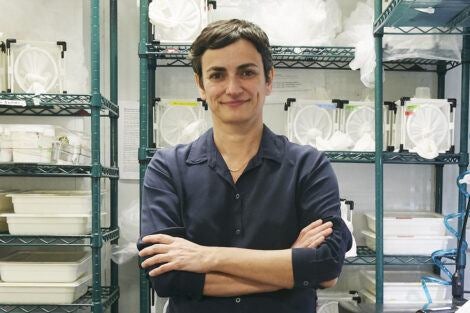For immediate release: Thursday, September 23, 2021
Boston, MA ─ The Howard Hughes Medical Institute (HHMI) has named Flaminia Catteruccia, professor of immunology and infectious diseases at Harvard T.H. Chan School of Public Health, as one of 33 new HHMI investigators. HHMI will provide Catteruccia with about $9 million in support, including salary, benefits, and a research budget, over a seven-year term. This support will allow Catteruccia to pursue her scientific interests and even change research focus during her renewable appointment.
The new HHMI investigators were selected for their individual scientific excellence from more than 800 eligible applicants. Mid-career researchers with 5 to 15 years of experience as faculty members at more than 200 institutions were eligible to apply.
“HHMI is committed to giving outstanding biomedical scientists the time, resources, and freedom they need to explore uncharted scientific territory,” says HHMI President Erin O’Shea. By employing scientists as HHMI Investigators, rather than awarding them research grants, she says, the Institute is guided by the principle of “people, not projects.”
Here is Catteruccia’s profile from HHMI’s announcement:
Mosquitoes have threatened human health for centuries, transmitting pathogens like malaria. By learning more about the biology of Anopheles mosquitoes and the malaria parasite that develops inside them, Flaminia Catteruccia hopes to find new solutions for disease control that are less harmful to the environment. Female mosquitoes must nourish their developing eggs, and human blood provides an ideal source of nutrients. Yet that blood often brings malaria parasites with it. At Harvard University, Catteruccia is piecing together the basic biology of how the eggs developing in the female mosquito’s ovaries tolerate the malaria parasites multiplying in her gut. To better understand the interplay between these two pathways, Catteruccia tapped into mosquitoes’ mating behavior. She and her team determined the role of a male steroid hormone that is transferred to the female mosquito during sex. It protects females’ eggs from damage by the malaria parasite and also blocks female mosquitoes from mating again. “Males and females are together for only 17 seconds, but it completely changes female physiology and behavior,” Catteruccia says. Going forward, the team’s insights into mosquito reproduction and parasite biology will help them develop more targeted antimalarial compounds. Such tools could crack down on the parasite without having broader health effects on mosquitoes, other insects, or humans. By aiming at the parasite, rather than the mosquito, Catteruccia wants to minimize the emergence of resistance to antimalarial compounds. Ultimately, she hopes her work can rein in “the deadliest parasite in the history of humankind.”
Visit the Harvard Chan website for the latest news, press releases, and multimedia offerings.
Photo: Kent Dayton
For more information:
Nicole Rura
nrura@hsph.harvard.edu
617.221.4241
###
Harvard T.H. Chan School of Public Health brings together dedicated experts from many disciplines to educate new generations of global health leaders and produce powerful ideas that improve the lives and health of people everywhere. As a community of leading scientists, educators, and students, we work together to take innovative ideas from the laboratory to people’s lives—not only making scientific breakthroughs, but also working to change individual behaviors, public policies, and health care practices. Each year, more than 400 faculty members at Harvard Chan teach 1,000-plus full-time students from around the world and train thousands more through online and executive education courses. Founded in 1913 as the Harvard-MIT School of Health Officers, the School is recognized as America’s oldest professional training program in public health.
The Howard Hughes Medical Institute is committed to advancing basic biomedical research and science education for the benefit of humanity. Its scientists, located across the country and around the world, have made important discoveries that advance our fundamental understanding of biology. In a complementary program at HHMI’s Janelia Research Campus in Ashburn, Virginia, leading scientists are pursuing long-term, high-risk, high-reward research in a campus designed to bring together researchers from disparate disciplines. The Institute also aims to transform science education into a creative, interdisciplinary endeavor that reflects the excitement of real research. For more information, visit www.hhmi.org.
